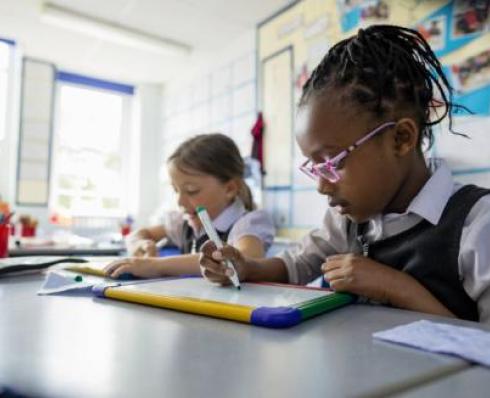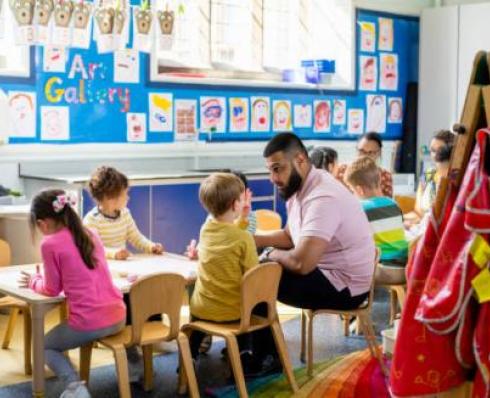
Primary
In developing the Partnership for Learning suite of courses, we aim to provide courses which are of interest to staff in our 4 key sectors: Early Childhood Education, Primary, Post-Primary and Further Education and Training. The following courses are all suited to Primary Education, although staff in other settings are free to participate in most of the courses provided.
|
Course Number |
Name of Course |
Dates |
|---|---|---|
|
PL01 |
Creativity and Creative Writing |
Monday 7th October '24 Monday 14th October '24 Monday 21st October '24 |
|
PL03 |
Teaching the new primary Mathematics Curriculum |
Monday 14th October '24 |
|
PL09
|
Developing the role of Treoraithe in their support of Student Teachers on school placement |
Tuesday, 5th November '24 Tuesday 12th November '24
|
|
PL10 |
Play pedagogy in the infant classroom |
Wednesday 6th November '24 Wednesday 13th November '24 Wednesday 20th November '24 |
|
PL14 |
Child protection and safeguarding for DLPs and DDLPs |
Wednesday 13th November '24
|
|
PL15 |
Child protection and safeguarding for primary school teachers |
Wednesday 4th December '24
|
|
PL16 |
Inclusive play practices in early childhood education |
Friday 6th December '24 |
|
PL18 |
Child protection and safeguarding for DLPs and DDLPs |
Wednesday 15th January '25
|
|
PL19 |
Understanding, living and leading the ethos in a Catholic school |
Thursday 24th January '25 |
|
PL20 |
Child protection and safeguarding for primary school teachers |
Wednesday 5th February '25
|
|
PL21 |
Developing Digital Literacy |
Thursday 6th February '25 Thursday 20th February '25 Thursday 13th March '25 |
|
PL22 |
Introduction to key legal issues for teachers
|
Monday 24th February '25 Monday 3rd March '25 Monday 10th March '25 |
|
PL24 |
An introduction to AD(h)D |
Thursday 27th February '25 |
| PL28 | Implementing CLIL and Translanguaging in Multilingual and Bilingual Classrooms | Wednesday 16th October ‘24 Wednesday 23rd October ‘24 |
Course Details

PL01 - Creativity and Creative Writing
| Dates | Monday 7th October '24 Monday 14th October '24 Monday 21st October '24 |
| Time | 5.30pm-7.00pm |
| Number of sessions/duration | 3 x 1 hour |
| Maximum No of participants | 300 |
| Course Leaders | Nora Nic Con Ultaigh |
| Format | Online via Zoom |
Course Outline
Fighting Words engages with schools and teachers across the island of Ireland offering creative writing workshops and projects from twenty-three locations. The organisation provides creative writing sessions in these centres, in schools, on-line, and convenes young writing groups, playwriting and scriptwriting groups, and summer camps for children and young people. In addition Fighting Words runs a programme at DCU focussed on teacher education, research, CPD and school outreach projects.
This course is for primary and post-primary school teachers and aims to provide an introduction to the participative and creative methodologies used by Fighting Words, including experiencing a Fighting Words workshop first hand. The course will focus on supporting teachers to use creative education and creative writing in their own classrooms, looking at different subject areas and integrated approaches. Participants will look at the educational research and impact data on creative writing for children and young people, and the resources and supports available to teachers.
In addition the course will cover the range of creative activities and opportunities available to students and teachers from Fighting Words, including creative writing projects organised to support teachers who want to write creatively themselves.
Profile of Course Leaders
Nora Nic Con Ultaigh is a representative of the creative writing centre 'Fighting Words' in DCU. She is an arts-in-education practitioner with over 20 years of experience. In 2004 she established Cups and Crowns Educational Theatre Company with two fellow graduates from the MA in Drama and Theatre Arts in NUIG. She also worked as a Post-Primary teacher of English, French and CSPE for 10 years. She currently works as a Regional Coordinator and Creative Associate on the Creative Schools programme. She has a passionate interest in creativity in education and in fostering youth voice within a rights-based model.

PL03 - Teaching the new Primary Mathematics Curriculum
| Dates | Monday 14th October '24 Monday 21st October '24 Monday 4th November '24 Monday 11th November '24 |
| Time | 7.00pm-8.00 pm |
| Number of sessions/duration | 4 x 1 hour |
| Maximum No of participants | 300 |
| Course Leader | Siún Nic Mhuirí |
| Format | Online via Zoom |
Course Outline
The new primary mathematics curriculum was released in September 2023 and in the school year 2024/25, schools will work to put it into practice. This interactive online course, co-presented by DCU lecturer and practising teacher, aims to explore the recommended pedagogies of the new primary mathematics curriculum and invites teachers to engage in collaborative inquiry into the implications for their teaching. Each week, we will focus on a selection of recommended practices such as the use of cognitively-demanding tasks, mathematical modeling, math talk, playful approaches and the development of productive disposition. The importance of these practices will be explored with reference to relevant literature and to video examples from Irish classrooms. Participants will be encouraged to reflect on the video examples and on their own practice. They will work collaboratively on mathematics tasks and selecting and adapting tasks for teaching. They will be encouraged to trial ideas in their own classrooms and report on their experience in later sessions.
Profile of Course Leader
Dr Siún Nic Mhuirí is a lecturer in mathematics education in Dublin City University. She is the lead on the Maths4All project, maths4all.ie, which aims to support mathematics teaching through the provision of high-quality activities and professional learning communities. She has contributed to curriculum change through her commissioned research for the NCCA, including the development of the mathematical modeling section of the Draft Primary Mathematics Toolkit.
Denis Kelly is a teacher in Adamstown Educate Together National School. He has a keen interest in mathematics education, and completed a Masters degree through DCU where his thesis focused on supporting the mathematics learning of students with English as an additional language. He is an active member of the Maths4All team, where he has developed activity plans and professional development materials. He has also presented at Teach Meets and facilitated a professional learning community focused on exploring the new curriculum.

PL09 - Developing the role of Treoraithe in their support of Student Teachers on school placement
| Dates | Tuesday 5th November '24 Tuesday 12th November '24 |
| Time | 5:00pm-7:00 pm |
| Number of sessions/duration | 2 x 2 hrs |
| Maximum No of participants | 300 |
| Course Leader | Sarah O'Grady & Eimear Holland |
| Format | Online via Zoom |
Course Outline
In the spirit of partnership, two workshops will be aimed at supporting primary and post-primary partners, specifically school-based placement coordinators and Treoraithe (formerly known as the Cooperating Teachers), who work with student teachers from DCU. These workshops will provide school-based partners with an overview of effective placement processes and provision, and explore a variety of ways in which partners can actively support and empower student teachers working with them and their pupils/students during placement periods. During these workshops partners will be facilitated to critically reflect upon and explore their mentoring practices in light of expanded skills, knowledge and understanding. Such practices may include: effective observation and feedback techniques; conducting professional learning conversation; and models of Team-Teaching etc.
Profile of Course Leader
Dr Sarah O’Grady is an Assistant Professor in Education at Dublin City University, Institute of Education. Sarah is Academic Coordinator of Professional Placement for the BEd in Gaeilge, and French or German or Spanish (BEdLan) programme at DCU, which is a four-year concurrent post-primary initial teacher education programme. Prior to joining DCU, Sarah taught modern languages for over fifteen years in the post-primary sector. Her research interests include teacher education policy and the development of reciprocal school-university partnerships.
Dr Eimear Holland is an Assistant Professor in Education at Dublin City University, Institute of Education. Eimear is Primary Professional Placement Coordinator of the Bachelor of Education (Primary) and Professional Masters in Education Programmes and formerly held a school placement coordinator role for post-primary. Prior to joining DCU, Eimear taught Physical Education and Religious Education in the post-primary sector whilst also engaging in the role of ‘teacher as a researcher’ and professional learning and development consultant and sat on the National Teacher Research Panel in the United Kingdom.

PL10 - Play Pedagogy in the Infant Classroom
| Dates | Wednesday 6th November '24 Wednesday 13th November '24 Wednesday 20th November '24 |
| Time | 6.00pm-8.00pm |
| Number of sessions/duration | 3 x 1 hour |
| Maximum No of participants | 300 |
| Course Leader | Fiona Giblin |
| Format | Online via Zoom |
Course Outline
Informed by research which identifies the most effective and appropriate pedagogical
approaches to early childhood education, this course aims to develop a teacher's pedagogy of play in the infant classroom through the sharing of practice; and engaging in professional conversations. The use of a mic/video will be required to participate in these online interactive sessions.
On completion, this course will enable primary teachers or Treoraí to:
- appraise a continuum of play to support young children's holistic and integrated learning and development
- implement the Primary School Curriculum Framework (DE, 2023) and integrate the curriculum areas through playful teaching and learning
- plan playful teacher-led learning experiences
- prepare the learning environment for child-led play
- become a skilled co-player and participate in children's play
- support DCU IoE student teachers' in developing their practice when on professional placement in the infant classroom
Profile of Course Leader
Fiona is an Assistant Professor in Early Childhood Education and contributes to undergraduate and postgraduate initial teacher education programmes. She is co-Programme Chair of the Master of Education in Early Childhood Education. Fiona has previously worked as a primary school teacher and contributed to the design and delivery of continuing professional development throughout the country, particularly to support teachers' pedagogy.

PL14 & PL18 - Child Protection and Safeguarding for DLPs and DDLPs
| Dates | Wednesday 13th November '24 (PL14) Wednesday January 15th '25 (PL18) |
| Time | 3.30pm-5.30pm (PL14) 7.00pm-9.00pm (PL18) |
| Number of sessions/duration | 1 x 2 hrs (repeated) |
| Maximum No of participants | 50 |
| Course Leader | Paul Knox |
| Format | Online via Zoom |
Course Outline
This course will review your main responsibilities in the context of the Child Protection Procedures for Primary and Post-primary schools. Participants will revise key procedures related to their responsibilities as a mandated person and a DLP. Content will include recording and reporting requirements for a DLP, the child protection oversight report as well as consideration of Child Protection and Safeguarding Inspections requirements undertaken by the Department of Education Schools Inspectorate.
Profile of Course Leader
Paul Knox is a former primary school teacher, principal and PDST advisor in the area of SPHE which included Child Protection. He is an Assistant Professor in SPHE in the Institute of Education, DCU.

PL15 & PL20 - Child Protection and Safeguarding for Primary School Teachers
| Dates | Wednesday December 4th '24 (PL15) Wednesday February 5th '24 (PL20) |
| Time | 3.30pm-5.30pm (PL15) 7.00pm-9.00pm (PL20) |
| Number of sessions/duration | 1 x 2 hrs (repeated) |
| Maximum No of participants | 50 |
| Course Leader | Paul Knox |
| Format | Online via Zoom |
Course Outline
This course will review your main responsibilities in the context of the Child Protection Procedures for Primary and Post-primary schools. Participants will revise key content related to signs and symptoms of abuse, handling a disclosure, and making a written record. Content will include responsibilities related to mandated rereporting, the threshold of harm and mandated assisting. The course will offer participants an opportunity to revise key responsibilities and reflect on their knowledge and understanding of child protection and safeguarding.
Profile of Course Leader
Paul Knox is a former primary school teacher, principal and PDST advisor in the area of SPHE which included Child Protection. He is an Assistant Professor in SPHE in the Institute of Education, DCU.

PL16 - Inclusive Play Practices in Early Childhood Education
| Dates | Friday 6th December '24 |
| Time | 6.00pm-8.00pm |
| Number of sessions/duration | 1 x 2 hrs |
| Maximum No of participants | 300 |
| Course Leader | Sinéad McNally & Christina O Keefe |
| Format | Online via Zoom |
Course Outline
This course will introduce educators to the most current and evidence-informed play practices to support the inclusion of all learners in Early Childhood Education (both in ECE settings and in Primary School classrooms). Upon completion of this short course, educators will be able to: (1) outline contemporary research evidence on play for inclusive Early Childhood Education; (2) recognise and understand principles underpinning inclusive play practices for all young learners; and (3) describe ways to develop and deliver inclusive play practices for all young learners.
Profile of Course Leader
Dr Sinéad McNally is an Associate Professor in Early Child Development and Education at the DCU Institute of Education. Sinéad is an internationally recognised scholar in young children's learning and development and has published widely on the impact of shared reading and play on children's early learning, with a special focus on the inclusion of autistic children in education. She is currently leading a national, interdisciplinary study of the school experiences of autistic children in primary and secondary schools in Ireland funded by the Irish Research Council.
Christina O'Keefe is an Assistant Professor in the School of Inclusive and Special Education. A graduate of the Bachelor of Education and Psychology programme at Mary Immaculate College Limerick, Christina's teaching career has primarily involved working as a special class teacher for autistic learners. Christina uses a rights-based approach and innovative participatory methods in her research to investigate children's perspectives of play in Early Childhood Education and has published her research in leading international Early Childhood Education journals.

PL19 - Understanding, Living and Leading the Ethos in a Catholic School
| Dates | 24th January '25 31st January '25 7th February '25 |
| Time | 4.00pm-6.00pm |
| Number of sessions/duration | 3 x 2 hrs |
| Maximum No of participants | 20 |
| Course Leader | Dr David Kennedy |
| Format | Online via Zoom |
Course Outline
Ethos, so what? All schools necessarily and implicitly espouse a vision of the human person and give expression to a particular ethos by their choices, actions, and priorities. This course brings participants into conversation with the role of ethos in Catholic schools. It speaks to ethos not as some abstract or aspirational concept, but as something that is lived out and acted upon in school communities. Participants will explore the question of ethos and patronage as it is encountered today in Irish education at primary and post-primary level. It highlights the distinctiveness of a Catholic ethos and the manner in which it is encountered in the day-to-day life of a Catholic school. From this short-course, participants will deepen their understanding of how the ethos underpins, contributes, and enhances the teaching and learning across the all the curriculum areas in a Catholic school and, as a result, enhance their capacity to effectively lead in this important aspect of the teaching and learning offered by a Catholic school in a pluralist Ireland.
Profile of Course Leader
Dr David Kennedy (BA; MA; PhD; SFHEA) is Assistant Professor of Religious Education in the School of Human Development at DCU, Institute of Education. He has worked extensively with national management and patronage/trusteeship bodies in Catholic Education in the Republic of Ireland in the area of ethos development at primary and post-primary level.

PL21 - Developing Digital Literacy
| Dates | Thursday 6th February '25 Thursday 20th February '25 Thursday 13th March '25 |
| Time | 4.00-6.00 pm |
| Number of sessions/duration | 3 x 2 hours |
| Maximum No. of participants | 70 |
| Course leader | Peter Tiernan |
| Format | Online via Zoom |
Course Outline
This introductory course will provide teachers with an opportunity to explore digital literacy as it relates to their classroom practice. The course will engage with relevant literature and policy documents to define digital literacy and provide detail on the competencies it includes. Participants will be encouraged to examine practical ways of developing their students digital literacy skills by reflecting on their practice and identifying ways to introduce: 1) Information, data and media literacy, 2) Online communication, collaboration and participation, 3) Digital content creation, 3) Online safety and wellbeing, 4) Problem solving using digital tools.
Profile of Course Leader
Dr Peter Tiernan is an Associate Professor of Digital Learning and Digital Literacy at the Institute of Education, Dublin City University. Peter is responsible for the design, delivery and evaluation of a broad range of modules at the Institute of Education, which enable teachers and other educators to harness the potential of technology in education while becoming critical evaluators of technology and the role it plays in teaching and learning, and in society more broadly. Peter's research covers the spectrum of digital learning, but he has a specialist interest in digital literacy and its development among students and wider society.

PL22 - Introduction to key legal issues for teachers
| Dates | Monday 24th February '25 Monday 3rd March '25 Monday 10th March '25 |
| Time | 6.30 pm - 8.00 pm |
| Number of sessions/duration | 3 x 1.5 hours |
| Maximum No of participants | 35 |
| Course Leader | Ciara Johnson |
| Format | Online via Zoom |
Course Outline
This course, which will take place over three evenings, offers teachers the opportunity to reflect on legal issues relevant to the school context. It will allow participants to become familiar with legislation and case law pertinent to a range of aspects of school life which will inform and enhance their practice. Indicative areas the course will address:
Indicative areas the course will address:
- The duty of care
- Supervision of students
- Child Protection
- Data Protection and Copyright
Profile of Course Leader
Ciara is a practising barrister with a particular interest in Education Law and Child Law. She has previously authored, tutored and assessed modules on the post-graduate Diploma/MA degree programme 'Education and the Law' in St. Angela's College, Sligo/NUIG. She lectures on a wide range of legal areas and cases relevant to school personnel including Management Bodies, Boards of Management, Senior Management, Teachers and other school personnel.

PL24 - An Introduction to AD(h)D: Teaching Children with ADHD Symptoms
| Dates | Thursday 27th February '25 |
| Time | 4.00pm-6.00pm |
| Number of sessions/duration | 1 x 2 hrs |
| Maximum No of participants | 20 |
| Course Leader | Gráinne McKenna & Ger Scanlon |
| Format | On Campus |
Course Outline
An overview of ADHD, its signs and symptoms, and the challenges this can present for students' academic learning, social-emotional well-being, and relationships with peers and school staff. We will share the experiences and perspectives of Irish teachers working with students who experience ADHD symptoms.
We will provide attendees with insights into evidence-based approaches and strategies that can be used to support children with ADHD symptoms within school settings.
Profile of Course Leader
Gráinne McKenna is an Assistant Professor at Dublin City University Institute of Education and has also worked as a primary school teacher and Developmental and Educational Psychologist. Gráinne has a special interest in social justice and teacher-child relationships.
Dr Ger Scanlon is an Associate Professor in Psychology and Education in the School of Human Development. She has significant experience of national and international collaboration on studies that explore and support the inclusion of Children with Special
Educational Needs in mainstream education.
Since 2021, Grainne and Ger have been working on TAC (Teaching ADHD Children), a European-wide project to support teachers working with children experiencing ADHD symptoms in school settings. As part of this project, teachers from across Europe, including over 200 Irish teachers, shared their experience, practice and knowledge of ADHD, and this informed the development of a continuing professional development programme for primary and secondary teachers that has now been piloted in Ireland, Germany, Portugal and Bulgaria.

PL28 - Implementing CLIL and Translanguaging in Multilingual and Bilingual Classrooms
| Dates | Wednesday 16th October ‘24 Wednesday 23rd October ‘24 |
| Time | 5.00pm-7.00pm |
| Number of sessions/duration | 2 x 2 hours |
| Maximum No. of participants | 15 |
| Course leader | Dr Ebru Eren & Dr Malgosia Machowska-Kosciak |
| Format | Online via Zoom |
Course Outline
This course aims to equip teachers with the necessary knowledge and skills to effectively implement Content and Language Integrated Teaching (CLIL) and Translanguaging strategies in multilingual and bilingual classrooms. Participants will explore the theoretical foundations of CLIL and Translanguaging, understand their practical implications, and learn how to design and deliver engaging lessons that leverage students' home languages and dialects. The course will cover topics such as principles of CLIL and Translanguaging, creating language-rich learning environments, integrating language and content objectives, scaffolding language development, and promoting intercultural understanding. Through interactive discussions, case studies, and hands-on activities, participants will develop practical strategies to support language and content learning for diverse student populations in Irish classrooms. CLIL and Translanguaging play pivotal roles in contemporary multilingual Irish classrooms by fostering cultural inclusivity, enhancing language proficiency, and promoting cognitive benefits.
By integrating language learning with content instruction and recognizing the value of students' home languages, these approaches create a more inclusive and effective learning environment, ensuring that language is not a barrier to academic success and preparing students for success in an increasingly interconnected world.
Profile of Course Leader
Dr Ebru Eren is a postdoctoral researcher at the Center for Human Rights and Citizenship (CHRE) Education at Dublin City University. Her research expertise includes linguistic and cultural diversity in the classroom, intercultural education, second language teaching as well as feminism and Queer theory. Previously, she worked at SSPC, the Science Foundation Ireland Research Centre for Pharmaceuticals, based at the University of Limerick. She holds a Ph.D. in Education from Trinity College Dublin, a Master's in Women's Studies, and a bachelor’s degree in Teaching English as a Second Language. Before her research career, she served as a post-primary language teacher in Turkey from 2007 to 2017.
Dr Malgosia Machowska-Kosciak (PhD) is a Post-Doctoral Researcher in Intercultural and Global Citizenship Education and Adjunct Assistant Professor at the Centre for Human Rights and Citizenship Education, The School of STEM Education, Innovation and Global Studies at DCU. She holds M. Phil and PhD in Sociolinguistics from Trinity College Dublin. Before she started work for CHRCE, Malgosia was affiliated with the Sociology Department in TCD and the Marino Institute of Education where she thought about issues connected to Migration and Education worldwide. She has been working with young migrants, refugees and asylum seekers through LMETB ( Louth and Meath Education and Training Board) for 10 years.
Interested in further study at DCU?
In addition to the Partnership for Learning non-accredited courses, the DCU Institute of Education also offers a wide arrange of postgraduate courses. See HERE for more details.
